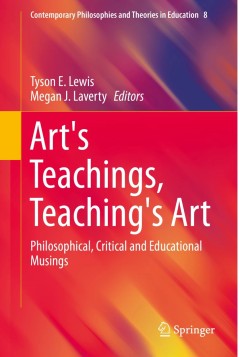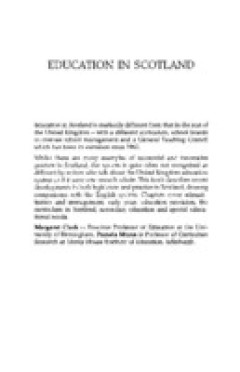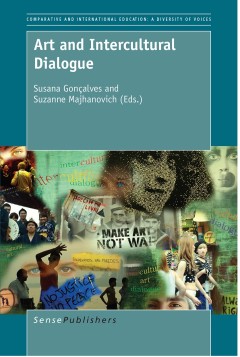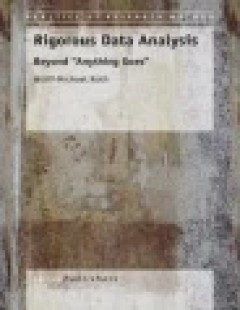Filter by

Higher Education Exchange between America and the Middle East in the Twenty-F…
Following a brief review of the historical background, Higher Education Exchange between America and the Middle East in the Twenty-First Century continues the higher education story with the events of 9/11. It describes the changes in US immigration policy and the implementation of student tracking systems, and their subsequent impact on Middle Eastern enrollments in US colleges and universitie…
- Edition
- -
- ISBN/ISSN
- 978-1-349-88747-7
- Collation
- XIII, 209
- Series Title
- -
- Call Number
- 370 BEV h

Art's Teachings, Teaching's Art: Philosophical, Critical and Educational Musings
This volume examines the interface between the teachings of art and the art of teaching, and asserts the centrality of aesthetics for rethinking education. Many of the essays in this collection claim a direct connection between critical thinking, democratic dissensus, and anti-racist pedagogy with aesthetic experiences. They argue that aesthetics should be reconceptualized less as mere art appr…
- Edition
- Ed. 1
- ISBN/ISSN
- 978-94-017-7191-7
- Collation
- XI, 249
- Series Title
- Contemporary Philosophies and Theories in Education
- Call Number
- 370 ART a

Education in Scotland
Education in Scotland is markedly different from what happens in the rest of the UK - with a different National Curriculum, school boards to oversee school management and a General Teaching Council which has been in existence since 1965. Whilst there are many examples of successful and innovative practice in Scotland, the system is quite often not recognised as different by writers who talk abo…
- Edition
- -
- ISBN/ISSN
- -
- Collation
- -
- Series Title
- -
- Call Number
- 370

High-Need Schools Changing the Dialogue
This book covers issues that pertain to high-need schools but the authors challenge the distinctions made in the research and reason that the issues are relevant to all schools. From the rise of accountability in the 1960s to now, high-need schools have been dealing with curriculum, program initiatives, and responding to diverse populations, typically without the resources necessary to implemen…
- Edition
- -
- ISBN/ISSN
- 978-94-6300-705-4
- Collation
- XVI, 134
- Series Title
- -
- Call Number
- 370 HIG

High Level Models and Methodologies for Information Systems
In this book the authors introduce and explain many methods and models for the development of Information Systems (IS). It was written in large part to aid designers in designing successful devices/systems to match user needs in the field. Chief among these are website development, usability evaluation, quality evaluation and success assessment. The book provides great detail in order to assist…
- Edition
- -
- ISBN/ISSN
- 978-1-4614-9253-5
- Collation
- XVI, 145
- Series Title
- -
- Call Number
- 004 ISA h

Art and Intercultural Dialogue
How can art act as an intercultural mediator for dialogue? In order to scrutinize this question, relevant theoretical ideas are discussed and artistic intervention projects examined so as to highlight its cultural, political, economic, social, and transformational impacts. This thought-provoking work reveals why art is needed to help multicultural neighbourhoods and societies be sustainable, as…
- Edition
- Ed. 1
- ISBN/ISSN
- 978-94-6300-423-7
- Collation
- -
- Series Title
- Comparative and International Education: A Diversity of Voices
- Call Number
- 370 ART a

Rigorous Data Analysis
In qualitative research, one can often hear the statement that research results are just (social) constructions. In criminal cases and in court hearings, we tend to expect that the true sequence of events has to be found rather than just any story. Here the author shows that qualitative social research can be conducted in the manner of police work or court proceedings. He does so by exhibiting …
- Edition
- -
- ISBN/ISSN
- -
- Collation
- -
- Series Title
- -
- Call Number
- -
Revitalizing Minority Voices
Whose voices are taken into account in language policy and planning and whose have been ignored or more actively silenced? This is the central question addressed in this book. What are the political and social factors that have helped to create these historical exclusions, in terms of endangerment and loss of traditional languages? What are the global influences on the local landscape of langua…
- Edition
- Ed. 1
- ISBN/ISSN
- 978-94-6300-187-8
- Collation
- -
- Series Title
- -
- Call Number
- -
Revisiting The Great White North?
Returning seven years later to their original pieces from this landmark book, over 20 leading scholars and activists revisit and reframe their rich contributions to a burgeoning scholarship on Whiteness. With new reflective writings for each chapter, and valuable sections on relevant readings and resources, this volume refreshes and enhances the first text to pay critical and sustained attentio…
- Edition
- Ed. 1
- ISBN/ISSN
- 978-94-6209-869-5
- Collation
- -
- Series Title
- -
- Call Number
- -
Revisiting Multiculturalism in Canada
In 1971 Canada was the first nation in the world to establish an official multiculturalism policy with an objective to assist cultural groups to overcome barriers to integrate into Canadian society while maintaining their heritage language and culture. Since then Canadas practice and policy of multiculturalism have endured and been deemed as successful by many Canadians. As well, Canadas mu…
- Edition
- -
- ISBN/ISSN
- 978-94-6300-208-0
- Collation
- -
- Series Title
- -
- Call Number
- -
 Computer Science, Information & General Works
Computer Science, Information & General Works  Philosophy & Psychology
Philosophy & Psychology  Religion
Religion  Social Sciences
Social Sciences  Language
Language  Pure Science
Pure Science  Applied Sciences
Applied Sciences  Art & Recreation
Art & Recreation  Literature
Literature  History & Geography
History & Geography